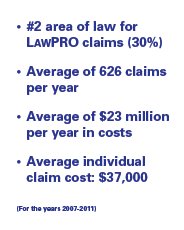Resolutions to avoid real estate claims


- I will ensure I meet with my clients in person at least once: In most real estate practices the staff handle many aspects of the client’s matter. However, ultimate responsibility still lies with the supervising lawyer. Take the time to meet with the client in person to review the transaction and understand the client instructions, particularly with respect to the client’s intended uses of the property. Not every matter is straightforward, and you don’t want to have to be addressing a problem that was only noticed the day the deal is to be closed, or never noticed at all.
- I will remember that the lender is also my client in most residential transactions: Lawyers often forget, because they deal face-to-face with the purchasers, that the lender is also their client and is owed a duty of care. You have to provide any information to the lender that is material to the transaction. The lending clients can bring claims against lawyers for failing to disclose all the relevant information they knew (or ought to have known).
- I will make sure I take my instructions from the person with the true interest at risk in the transaction: At times it may be easier to gather information relevant to the transaction from intermediaries like a mortgage broker or real estate agent. However, in the event of a claim lawyers need to be able to show that they took their instructions from the person with the value at risk in the transaction, or at least have documentation from that person authorizing the lawyer to take instructions from the intermediary in all circumstances.
- I will document my conversations with and instructions from the client: This is the best defence you’ll have against a malpractice claim. The client may only be involved in one or two real estate transactions in their lifetime and will remember the details, while the lawyer who sees countless transactions will likely have little specific recollection of one matter. Keep notes of your conversations with the client and document what you discussed and what actions you took in a detailed reporting letter to the client.
- I will not give my electronic registration password to my clerks or anyone else: Only the lawyer who received the electronic registration credentials provided by the Ministry of Government Services is entitled to use the lawyer disc and password to register an instrument on title using the electronic system. And yet LAWPRO sees claims in which the lawyer allowed (or claims not to have been aware) that someone else in the office was using the password. As tempting as it may be in a busy real estate practice to let the clerk register instruments requiring a lawyer’s electronic signature…don’t.
Click here to see the full list of resolutions taken from New Year’s resolutions for a healthier law practice and a new you, which appeared in the December 2012 issue of LAWPRO Magazine.
Categories: Real Estate

February 09, 2013 at 7:51 am, Brian Linnekens said:
You have shared some very useful information for avoiding the real estate claims.One can get many points from this post.